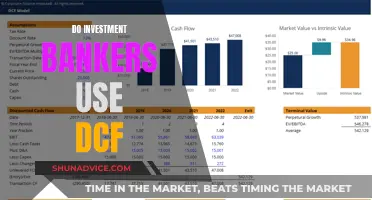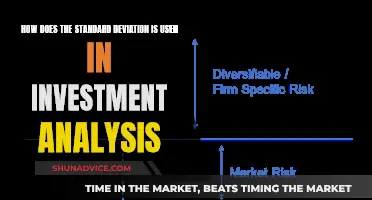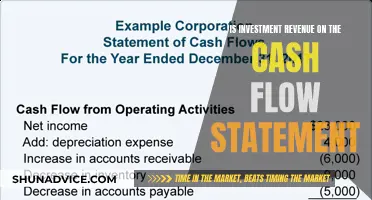
Seasoning refers to the amount of time that has passed since a debt security was issued and has been made available for public trade. In the context of cash-out investments, seasoning refers to the amount of time an investor has held an asset before they can cash out on a refinance without penalty. Seasoning requirements vary depending on the type of investment and the lender, but they generally range from three to twelve months. These requirements are put in place to benefit lenders by establishing the creditworthiness of borrowers and reducing the risk of default. However, seasoning can also be advantageous to investors, as it allows them to build up equity and improve their loan-to-value ratio, making them more attractive to lenders and increasing their chances of obtaining desirable refinancing rates.
| Characteristics | Values |
|---|---|
| Definition of seasoning | The amount of time that has passed since a debt security has been issued and available to be publicly traded |
| Seasoning in real estate | The duration of payments made on an investment, like a property loan |
| Seasoning and refinancing | Lenders require seasoning to establish the creditworthiness of prospective borrowers |
| Seasoning and refinancing | Lenders require seasoning to discourage fraud |
| Seasoning and refinancing | Lenders require seasoning to verify the financial stability of borrowers |
| Seasoning and refinancing | Lenders require seasoning to reduce the risk of default |
| Seasoning requirements | Lenders want to see that money has been in an established account anywhere from 60 to 90 days |
| Seasoning requirements | Lenders require seasoning for cash-out refinancing |
| Seasoning requirements | Lenders require seasoning for removing mortgage insurance |
| Seasoning requirements | Lenders require seasoning for refinancing |
| Seasoning requirements | Lenders require seasoning for reverse mortgages |
| Seasoning and bankruptcy | Lenders require a bankruptcy waiting period of 4 years for Chapter 7 or Chapter 11 (2 years with exceptions); 2 years from discharge or 4 years from dismissal of Chapter 13 |
| Seasoning and foreclosure | Lenders require a foreclosure waiting period of 7 years; 3 years with exceptions |
| Exceptions to seasoning requirements | Bonuses, tax refunds, and money gifted from a relative |
What You'll Learn

Lenders' seasoning requirements
In the context of mortgages, seasoning can also refer to the time you've had your current mortgage. This becomes relevant if you want to refinance or remove mortgage insurance. For example, you may need to have your mortgage for at least six months before refinancing.
Lenders with stricter requirements might demand a seasoning period of up to a year. This is to ensure that you have a track record of paying your current loan and that you have made improvements to the property. They may also want to discourage fraud, where borrowers cash out a property with serious hidden defects that reduce its value.
Some lenders may waive seasoning requirements if they are confident in the income-generating potential of the property, such as through a signed lease for a rental home. Additionally, certain types of funds, like employer bonuses and tax refunds, are typically exempt from seasoning timelines and can be used immediately for a down payment.
Understanding the Cash Flows Statement: Investing Activities
You may want to see also

Seasoning and mortgage refinancing
Seasoning, in the context of cash-out investments, refers to the waiting period before you can refinance your mortgage to get cash from your home equity. This means getting a new loan that is bigger than your current mortgage, so you receive the extra amount in cash.
For example, if you're looking to refinance an FHA loan, you usually need to wait at least 210 days from the date of your last mortgage payment and have made at least six mortgage payments. For conventional loans, most lenders require that your down payment funds be in your account for at least 60 days before they can be used toward a home purchase.
Lenders have these requirements because they want to see a good history with your current loan. They also want to ensure that the money used for a down payment wasn’t obtained illegally or borrowed. This process helps prevent mortgage fraud and ensures financial stability.
Seasoning can be frustrating for real estate investors because it slows them down by trapping cash in their property that they could otherwise be using to buy more properties. However, there are some lenders with no seasoning requirements, and some ways to get around seasoning periods. For example, if you own a property in full and then perform a value-added renovation, there may be no seasoning period if you do not have a mortgage on the property.
Understanding Investment Cash Flow Entries and Their Impact
You may want to see also

Seasoning and mortgage fraud
Seasoning refers to the length of time that money is in a home buyer's bank account before it's used to purchase a home or refinance a mortgage. Typically, lenders require funds to be seasoned for at least 60 days, but this period can vary depending on the lender's policies and the specific circumstances of the mortgage application.
Lenders use seasoning to ensure the legitimacy and stability of a home buyer's finances. Longer seasoning periods are linked to lower probabilities of fraud and default. If a borrower has unseasoned funds in their account, the lender will require documentation of the source. The mortgage application will only consider explained deposits or funds with a clear paper trail.
Mortgage seasoning can also refer to the time you've had your current mortgage, which becomes a factor if you're trying to refinance or remove mortgage insurance. For example, you may need to have your mortgage for a specific time, often at least six months, before refinancing.
Mortgage lenders take on substantial risk when offering loans, so they go to great lengths to ensure borrowers can meet the long-term financing obligations. Mortgage seasoning helps lenders identify the potential for fraud or misrepresentation. By observing a borrower's payment history and bank accounts over a certain period, lenders can better assess their financial stability and reliability.
There are several types of mortgage seasoning:
- Refinancing: A seasoning period is often required before you can refinance a mortgage. The length of the seasoning period depends on the type of loan and the specific action being taken.
- Down Payment Seasoning: Lenders typically request to see the borrower's most recent two months of bank statements to ensure the funds used for a down payment are legitimately theirs and not borrowed temporarily.
- Bankruptcy and Foreclosure Seasoning: After a bankruptcy or foreclosure, lenders require a seasoning period before the borrower can qualify for a new mortgage.
- Reverse Mortgage Seasoning: When taking out a Home Equity Conversion Mortgage (HECM), the Department of Housing and Urban Development (HUD) imposes a seasoning requirement of one year for any other existing liens.
QuickBooks: Recording Non-Cash Investing and Financing Activities
You may want to see also

Seasoning and issue reputation
Seasoning refers to the passage of time associated with a security available for trading on the secondary market. In the context of cash-out investments, seasoning specifically refers to the amount of time that has passed since the funds for a down payment have been in a bank account. This is usually between 60 and 90 days.
Lenders require seasoning to establish the creditworthiness of borrowers and avoid fraud. Seasoning helps to verify the financial stability of borrowers and reduces the risk of default. It also allows lenders to see a track record of loan repayment.
In the mortgage sector, seasoning refers to the age of the mortgage. A mortgage is typically considered fully seasoned when it has been held for at least a year. If the mortgage is less than a year old, it is considered unseasoned, and lenders may not approve selling or refinancing the loan due to the higher risk.
Seasoning can also apply to refinancing an investment property, such as a cash-out refinance. Most lenders require a seasoning period of around six months before allowing a cash-out refinance of a newly acquired rental property. This can be frustrating for investors as it slows them down by trapping cash in the property that could be used to invest in other properties.
Some lenders do not have seasoning requirements for cash-out refinances. However, these lenders may have stricter requirements for investors, such as a higher credit score, loan-to-value ratio, or interest rates.
Seasoning may offer benefits to real estate investors, particularly those who may not qualify for refinancing under a lender with seasoning requirements. Waiting for seasoning to occur can result in better interest rates, more equity, and time to build up a favourable loan-to-value ratio.
Cash Flow and Investing: What's the Real Relationship?
You may want to see also

Seasoning and the BRRRR strategy
The BRRRR (Buy, Rehab, Rent, Refinance, Repeat) method is a real estate investment strategy that involves buying distressed properties, renovating them, renting them out, and then refinancing to pull out the original investment plus any additional equity. This allows investors to repeat the process with new properties and grow their real estate portfolio.
One of the key components of the BRRRR strategy is the ability to refinance the property after it has been rehabbed and rented out. This is where the concept of "seasoning" comes into play. Seasoning refers to the amount of time that an investor must wait after purchasing a property before they are allowed to do a cash-out refinance.
The seasoning period can vary depending on the lender and the type of loan. Some lenders may require a seasoning period of 6 months or more, while others may have no seasoning requirements at all. It is important for investors to shop around and compare different lenders' requirements before deciding on a loan.
The length of the seasoning period can have a significant impact on the success of the BRRRR strategy. A long seasoning period can slow down the investor's progress by trapping cash in the property that could otherwise be used to purchase new properties. On the other hand, a short or non-existent seasoning period can accelerate the turnover of capital and allow investors to build their portfolio faster.
For example, let's consider two rental investors, Investor A and Investor B, who both use the BRRRR method. Investor A works with a lender that has no seasoning requirement, while Investor B works with a lender that requires a 6-month seasoning period. Both investors cash out 100% of their invested capital and utilize it for new projects. As a result of the shorter seasoning period, Investor A is able to complete and start new projects every 3 months, while Investor B can only do so every 6 months. Starting from 0 properties, after 5 years, Investor A will have a portfolio of 20 properties, while Investor B will only have half that number.
In conclusion, the BRRRR strategy is a powerful tool for real estate investors, but it is important to carefully consider the seasoning requirements of any loans involved. A shorter seasoning period can help accelerate the growth of an investor's portfolio and maximize their returns.
Investing Strategies for Effective Cash Management
You may want to see also
Frequently asked questions
Seasoning refers to the amount of time that has passed since a debt security has been issued and been made available to be publicly traded. In the case of a cash-out investment, seasoning refers to the amount of time that has passed since the investment was made.
Lenders require seasoning to establish the creditworthiness of prospective borrowers. It helps them avoid borrowers who may be attempting to engage in mortgage fraud or who may have obtained the money for a down payment through illegal means.
Seasoning allows lenders to verify the financial stability of borrowers and reduces the risk of default. It also reassures lenders that the cash on hand is real.







